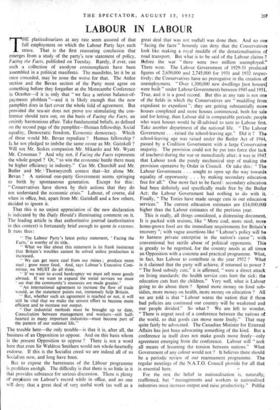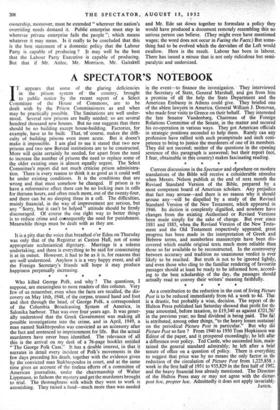LABOUR IN LABOUR
THE platitudinarians at any rate seem assured of that full employment on which the Labour Party lays such stress. That is the first reassuring conclusion that emerges from a study of the party's new statement of policy, Facing the Facts, published on Tuesday. Rarely, if ever, can such a collection of anodyne commonplaces have been assembled in a political manifesto. The manife§to, let it be at once conceded, may be none the worse for that. The Attlee section and the Bevan section of the Party must agree on something before they forgather at the Morecambe Conference in October—if it is only that "we face a serious balance-of- payments pfoblem "—and it is likely enough that the new pamphlet does in fact cover the whole field of agreement. But provided the, sea-air does not prove too stimulating the con- ference should turn out, on the basis of Facing the Facts, an entirely harmonious affair. Take fundamental beliefs, as defined on the second page of the pamphlet—Human fellowship, Social equality, Democratic freedom, Economic democracy. Which of these would Mr. Bevan repudiate ? Human fellowship ? Is he not pledged to imbibe the same ozone as Mr. Gaitskell ? Will not Mr. Stokes companion Mr. Mikardo and Mr. Wyatt Mr. Crossman ? And why not, if Facing the Facts represents the whole gospel ? Or, "to win the economic battle there must be higher efficiency in industry." Can Mr. Churchill and Mr. Butler and Mr.' Thorneycroft contest that—let alone Mr. Bevan ? A national one-party Government seems springing to birth by spontaneous generation. Except for this: "Conservatives have shown by their actions that they do not understand the economic crisis." Labour, of course, did when in office, but, apart from Mr. Gaitskell and a few others, decided to ignore it.
That this is no unjust appreciation of the new declaration is indicated by the Daily Herald's illuminating comnient on it. The leading article in that authoritative journal (authoritative in this context) is fortunately brief enough to quote in extenso. It runs thus: "The Labour Party's latest policy statement, ' Facing the Facts,' is worthy of its title.
" What we like about this statement is its frank insistence that Britain's troubles cannot be solved unless production is increased.
– We can get more coal from oui mines ; produce more steel ; grow more food. And, says Labour's Executive Com- mittee, we MUST do all three.
"If we want to avoid bankruptcy we must sell more goods abroad. If we want to expand the social services we must 'see that the community's resources are made greater.'
"An international agreement to increase the flow of trade would, as the statement points out, immensely help Britain.
" But, whether such an agreement is reached or not, it will still be vital that we make the utmost effort to become more efficient and to increase our output.
" Our industrial methods must be brought up to date. Consultation between management and workers—still half- hearted in many important industries—must become part of the pattern of our national life."
The trouble here—the only trouble—is that it is, after all, the business of an Opposition to oppose. And on this basis whom is the present Opposition to oppose ? There is not a word here that even Sir Waldron Smithers would not whole-heartedly endorse. If this is the Socialist creed we are indeed all of us Socialists now, and long have been.
But to expose the barrenness of the Llbour programme is profitless eno&gh. The difficulty is that there is so little in it that provides substance for serious discussion. There is plenty of emphasis on Labour's record while in office, and , no one will deny that a great deaf of very useful work (as well as a great deal that was not useful) was done then. And no one "facing the facts" honestly can deny that the Conservatives look like making a royal muddle of the denationalisation of road transport. But what is to be said of the Labour claims ? Before the war "there were two million unemployed." There were. The Labour Government of 1929-31 produced figures of 2,650,000 and 2,745,000 for 1931 and 1932 respec- tively; the Conservatives have no prerogative in the creation of unemployment. "Over 1,300,000 new dwellings [not houses] • were built" under Labour Governments between 1945 and 1951. True, and it is a good record. But this at any rate is not one of the fields in which the Conservatives are "muddling from expedient to expedient "; they are getting substantially more houses completed and more houses commenced, both for sale and for letting, than Labour did in comparable periods; people who want houses would be ill-advised to turn to Labour first. Take another department of the national life. "The Labour Government. . . raised the school-leaving age." Did it ? The school-leaving age was raised under the Butler Act of 1944, passed by a Coalition Government with a large Conservative majority. The provision could not be put into force (for lack of teachers) during the war or immediately after; it was in 1947 that Labour took the purely mechanical step of making the provision operative by Order in Council. Or take this: "The Labour Government . . . sought to open up the way towards equality of opportunity . . . by making secondary education free for all." One more fact to be faced: secondary education had been definitely and specifically made free by, the Butler Act; the Labour Government had nothing to do with it. Finally, "The Tories have made savage cuts in our education services." The current edccation estimates are £14,000,000 higher than the Labour estimates of the preVious year.
This is really, all things considered, a distressing document. It is packed with truisms, like "More coal, more steel, more home-grown food are the immediate requirements for Britain's recovery "; with vague assertions like "Labour's policy will be to harness private enterprise in the nation's cause "; with conventional but sterile abuse of political opponents. This is greatly to be regretted, for the country needs at all times an Opposition with a concrete and practical programme. What, in fact, has Labour to contribute in the year 1952? What is it claimed that the party will achieve, if returned to power ? "The food subsidy cuts," it is affirmed, "were a direct attack on living standards; the health service cuts hurt the sick; the education cuts hurt the children." Very well, what is Labour going to do about them ? Spend more money on food sub- sidies, more money on health, more money on education ? All we are told is that "Labour warns the nation that if these bad policies are continued our country will be weakened and our people divided." So what ? We are left to wonder. "There is urgent._ need of a conference between the nations of the world, so that goods can move more freely." That may quite fairly be advocated. The Canadian Minister for External Affairs has just been advocating something of the kind. But a conference in itself does not make goods move freely—only agreement emerging from the conference. Labour will "seek all means of lessening the tension between nations." What Government of any colour would not ? It believes there should be a periodic review of our rearmament programme. The regular meetings of the N.A.T.O. Council provide for all that is essential here.
For the rest the belief in nationalisation is, naturally. reaffirmed, but "managements and workers in nationalised industries must increase output and raise productivity." Public ownership, moreover, must be extended "wherever the nation's overriding needs demand it. Publie enterprise must step in wherever private enterprise fails the people "; which means whatever it may mean. Is it really to be concluded that this is the best statement of a domestic policy that the Labour Party is capable of producing ? It may well be the best that the Labour Party Executive is capable of producing. But that if Mr. Attlee, Mr. Morrison, Mr. Gaitsktll and Mr. Ede sat down together to formulate a policy they would have produced a document remotely resembling this no serious person can believe. (They might even have mentioned wages; the word does not occur in Facing the Facts.) But some- thing had to be evolved which the dervishes of the Left would swallow. Here is the result. Labour has been in labour. There has issued a mouse that is not only ridiculous but semi- paralytic and undersized.



























 Previous page
Previous page